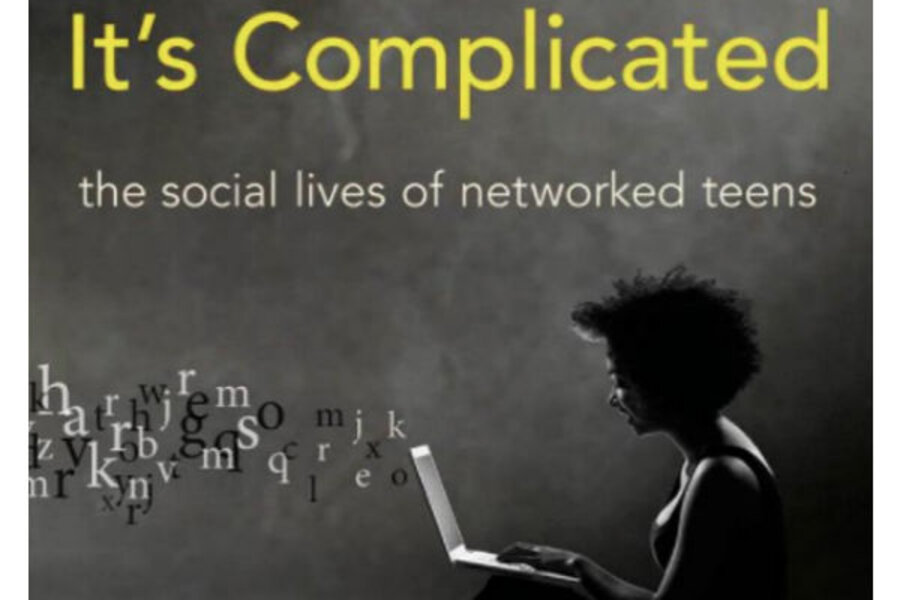'It's Complicated': Parents get a teen view of social media
Loading...
Why is the title of social media researcher danah boyd’s (her legal name is spelled with lower case) new book “It’s Complicated“? Not just because “the Social Lives of Networked Teens” are complicated, but also because growing up in a networked world is too.
And I’d add that it’s further complicated when the adults in a teen’s life don’t have any idea how complicated it is – when they reduce it to “too much screen time.”
What’s not complicated is the need for teens' input in the public discussion about teens’ experiences in social media.
So, I wish every parent, educator, and anyone with even one young person in their life would read this book. It’s a rare window on young people’s perspectives coming from a geeky (tech-savvy) researcher, with a fascination for how both youth culture and networked culture are changing society, and each other.
As Ms. boyd studied the emerging phenomena of networked culture and youth culture (from 2005 to 2012), she kept bumping into two other phenomena: all the fears in society about youth and social networks, and a real lack of input from young people themselves.
Mike, a 15-year-old interviewee she mentions in her preface, pretty much says it all:
“As we were talking and laughing and exploring Mike’s online videos (of mixing Diet Coke and Mentos, among other "explosively" popular threads on YouTube in 2006), Mike paused and turned to me with a serious look on his face,” boyd writes. “ ‘Can you do me a favor?’ he asked, ‘Can you talk to my mom? Can you tell her that I’m not doing anything wrong on the Internet?’ I smiled and promised him that I would.”
A window on growing up
But she did more than that – she collected about six years of observations and interviews, online and in person, with teens from “a wide array of socioeconomic and ethnic communities” in 18 states.
And she talked with a lot more parents than Mike’s mom, as well as teachers, librarians, youth ministers, and others who worked with youth. This book is riddled with stories of teens’ experiences in social media, based on conversations and observations.
It’s hard to exaggerate the value those perspectives have for our society – not just for people working with youth, but also for shaping policy, protective services, and our understanding of how to live well in this very user-driven, networked world, as well as how to help our children prepare to run it.
Key takeaways
Here are some of my top takeaways from "It’s Complicated," which has just eight chapters, each with a simple heading such as “Identity,” “Privacy,” “Danger,” “Literacy,” and my own favorite, “Searching for a public of their own,” which was the focus of boyd’s groundbreaking 2008 doctoral dissertation.
Teens taking ownership: boyd writes, “Far from being a distraction, social media is providing a vehicle for teens to take ownership over their lives.” In other words, it has become one of the navigation tools of growing up.
The Internet is a mirror of society’s everyday life, as much as teens’ everyday lives: boyd writes, “The internet mirrors, magnifies and makes more visible the good, bad and ugly of everyday life. As teens embrace these tools and incorporate them into their daily practices, they show us how our broader social and cultural systems are affecting their lives…. In making networked publics their own, teens bring with them the values and beliefs that shape their experiences.”
So the teen behaviors and activities we see in social media aren’t just a reflection on them. This seems to be a difficult one – easier to blame problems that turn up in social media on the media or bad policymaking.
Adults’ lack of context: What youth object to more than adults monitoring is adults taking what they see out of context and passing judgment, blaming, or disciplining without understanding. Teens are sometimes, as boyd describes, “blamed for not thinking, while adults assert the right to define the context in which young people interact; they take content out of context to interpret it through the lens of adults’ values.” This underlines why talking with our kids about social-media issues is so important.
Privacy is more than we think it is: And privacy is important to teens and growing up. It’s certainly something much bigger than what happens in social media, but in social media it’s both a negotiation and a calculation – a negotiation over constantly changing conditions and a calculation of future impacts from what one posts now. What plays out in social media is partially what boyd describes as a “struggle to manage their identity.” Although identity formation is a huge part of adolescence, this struggle to manage identity in social media is not unique to teens; everybody in social media deals with the self-presentation aspect to some degree.
Privacy and control: Privacy has a lot to do with being able to control a social situation, and to gain control, a person needs three things, boyd writes: “a certain degree of agency or power within a social situation (bullying targets have lost that agency),” “a reasonable understanding of the social situation and context in which s/he is operating,” and “the skills to manage the social situation in order to both understand and affect how information flows and is interpreted.” It’s easy to understand the title of her book as she outlines these privacy nuances.
Why teens want privacy: “Privacy is valuable because it is critical for personal development,” boyd writes. What I’ve learned from this book is that teens need and justifiably seek space free of surveillance (which mostly means free of judgment) to figure things out – identity, relation to others, their passion, or purpose, etc. – none of which suggests that they don’t also seek guidance and adults’ attention.
Cries for attention: “All too often, teens who engage in risky behaviors do so in reaction to what’s happening at home or in the hopes that their parents might notice,” says boyd. For examples, see this story about boyd's pioneering work on this subject, and this story for the latest tragic example in the United Kingdom.
Publicity is not the opposite of privacy: To a degree, it can be part of managing both privacy and one’s public image (sometimes called “online reputation,” but that’s too narrow a term). “Sharing at least a little bit affords … more privacy than sharing nothing at all,” boyd writes. She continues, “In a world in which posting updates is common, purposeful, and performative, sharing often allows teens to control a social situation more than simply opting out.”
Fear is not helpful: “In an effort to address online safety concerns, most adults respond by trying to quarantine youth from adults, limit teens’ engagement online or track teens’ every move. Rhetoric surrounding online predation is used to drum up fear and justify isolation. But neither restrictions nor adult or institutional surveillance will help those who are seriously struggling. And we need to address the underlying issues that are at the crux of risky behaviors rather than propagate distracting myths. Fear is not the solution; empathy is." This is an eloquent argument for getting social-emotional learning into every school.
Helping each other's children: “The Internet is not just a place where people engage in unhealthy interactions. It’s also a place where people share their pain,” writes boyd. She explains, telling readers that when youth “who are struggling cry out for help online … someone should be there to recognize those signs and react productively.” Increasingly, boyd points out that we need “a society in which adults are willing to open their eyes and pay attention to youth other than their own children” (e.g., see this).
This is a very accessible book – it’s just 215 pages long – made even more so with all the stories Boyd has woven in. I hope you’ll read it. It’ll be good for the kids you know and love. Learning from them, we can parent better, make better policy at school, state, and national levels, and maybe even lighten up a little with them and enjoy the journey together. We might even partner with them to co-create a networked world that we all want to live in.






